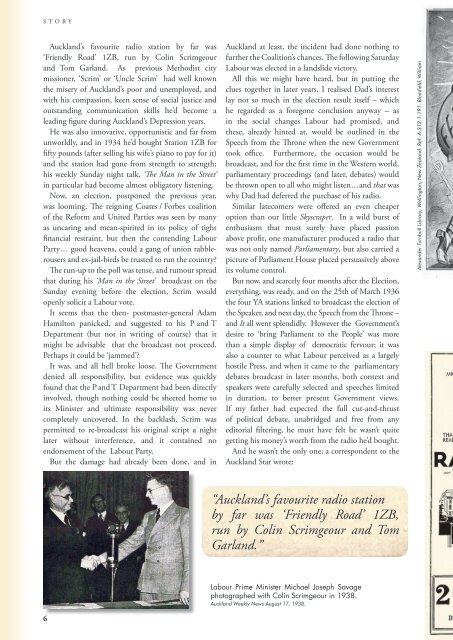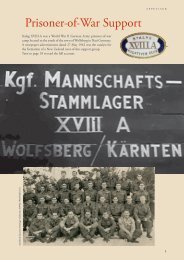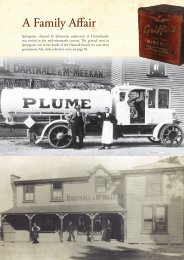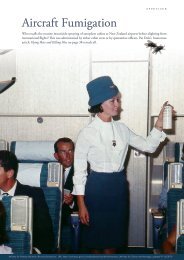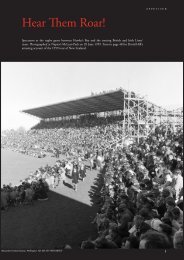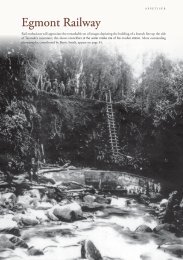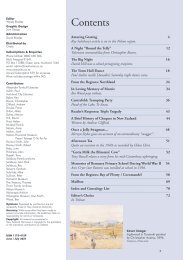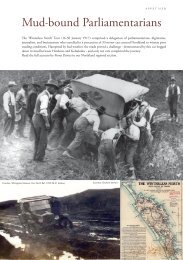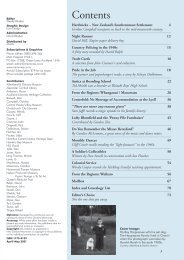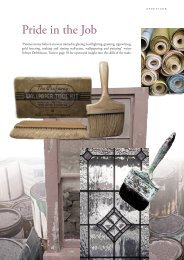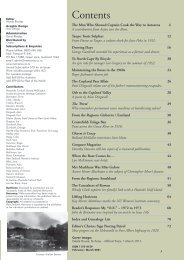Create successful ePaper yourself
Turn your PDF publications into a flip-book with our unique Google optimized e-Paper software.
STORY<br />
Auckland’s favourite radio station by far was<br />
‘Friendly Road’ 1ZB, run by Colin Scrimgeour<br />
and Tom Garland. As previous Methodist city<br />
missioner, ‘Scrim’ or ‘Uncle Scrim’ had well known<br />
the misery of Auckland’s poor and unemployed, and<br />
with his compassion, keen sense of social justice and<br />
outstanding communication skills he’d become a<br />
leading figure during Auckland’s Depression years.<br />
He was also innovative, opportunistic and far from<br />
unworldly, and in 1934 he’d bought Station 1ZB for<br />
fifty pounds (after selling his wife’s piano to pay for it)<br />
and the station had gone from strength to strength;<br />
his weekly Sunday night talk, ‘The Man in the Street’<br />
in particular had become almost obligatory listening.<br />
Now, an election, postponed the previous year,<br />
was looming. The reigning Coates / Forbes coalition<br />
of the Reform and United Parties was seen by many<br />
as uncaring and mean-spirited in its policy of tight<br />
financial restraint, but then the contending Labour<br />
Party… good heavens, could a gang of union rabblerousers<br />
and ex-jail-birds be trusted to run the country?<br />
The run-up to the poll was tense, and rumour spread<br />
that during his ‘Man in the Street’ broadcast on the<br />
Sunday evening before the election, Scrim would<br />
openly solicit a Labour vote.<br />
It seems that the then- postmaster-general Adam<br />
Hamilton panicked, and suggested to his P and T<br />
Department (but not in writing of course) that it<br />
might be advisable that the broadcast not proceed.<br />
Perhaps it could be ‘jammed’?<br />
It was, and all hell broke loose. The Government<br />
denied all responsibility, but evidence was quickly<br />
found that the P and T Department had been directly<br />
involved, though nothing could be sheeted home to<br />
its Minister and ultimate responsibility was never<br />
completely uncovered. In the backlash, Scrim was<br />
permitted to re-broadcast his original script a night<br />
later without interference, and it contained no<br />
endorsement of the Labour Party.<br />
But the damage had already been done, and in<br />
Auckland at least, the incident had done nothing to<br />
further the Coalition’s chances. The following Saturday<br />
Labour was elected in a landslide victory.<br />
All this we might have heard, but in putting the<br />
clues together in later years, I realised Dad’s interest<br />
lay not so much in the election result itself – which<br />
he regarded as a foregone conclusion anyway – as<br />
in the social changes Labour had promised, and<br />
these, already hinted at, would be outlined in the<br />
Speech from the Throne when the new Government<br />
took office. Furthermore, the occasion would be<br />
broadcast, and for the first time in the Western world,<br />
parliamentary proceedings (and later, debates) would<br />
be thrown open to all who might listen…and that was<br />
why Dad had deferred the purchase of his radio.<br />
Similar latecomers were offered an even cheaper<br />
option than our little Skyscraper. In a wild burst of<br />
enthusiasm that must surely have placed passion<br />
above profit, one manufacturer produced a radio that<br />
was not only named Parliamentary, but also carried a<br />
picture of Parliament House placed persuasively above<br />
its volume control.<br />
But now, and scarcely four months after the Election,<br />
everything, was ready, and on the 25th of March 1936<br />
the four YA stations linked to broadcast the election of<br />
the Speaker, and next day, the Speech from the Throne –<br />
and It all went splendidly. However the Government’s<br />
desire to ‘bring Parliament to the People’ was more<br />
than a simple display of democratic fervour; it was<br />
also a counter to what Labour perceived as a largely<br />
hostile Press, and when it came to the parliamentary<br />
debates broadcast in later months, both context and<br />
speakers were carefully selected and speeches limited<br />
in duration, to better present Government views.<br />
If my father had expected the full cut-and-thrust<br />
of political debate, unabridged and free from any<br />
editorial filtering, he must have felt he wasn’t quite<br />
getting his money’s worth from the radio he’d bought.<br />
And he wasn’t the only one; a correspondent to the<br />
Auckland Star wrote:<br />
Alexander Turnbull Library, Wellington, <strong>New</strong> <strong>Zealand</strong>. Ref: A-312-1-191. Blomfield, William<br />
“Auckland’s favourite radio station<br />
by far was ‘Friendly Road’ 1ZB,<br />
run by Colin Scrimgeour and Tom<br />
Garland.”<br />
Labour Prime Minister Michael Joseph Savage<br />
photographed with Colin Scrimgeour in 1938.<br />
Auckland Weekly <strong>New</strong>s August 17, 1938.<br />
6


